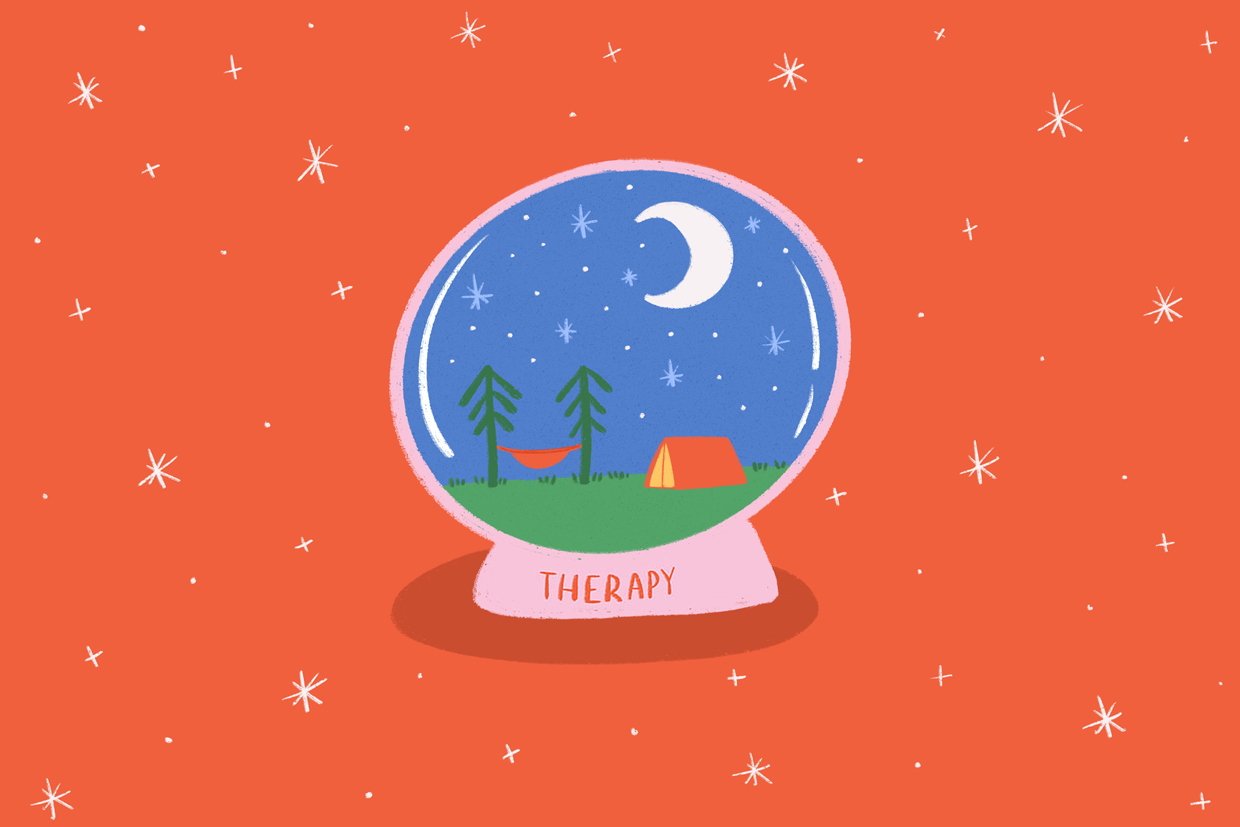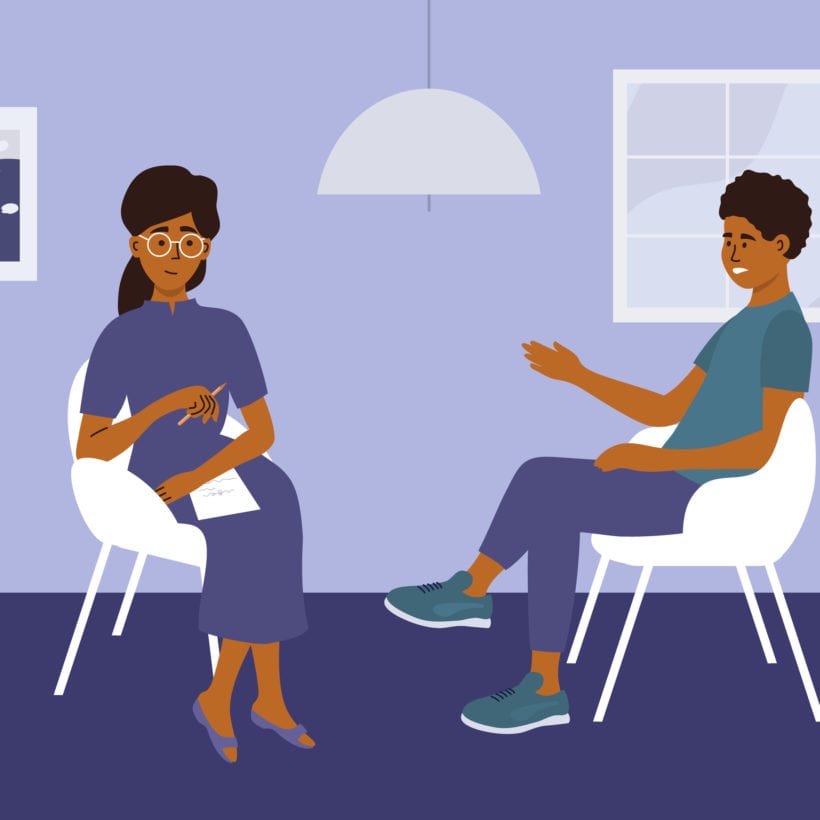As we sink into the third year of the pandemic — and seemingly a new variant every other week — it’s understandable if you’re mentally in a dark place. Before the pandemic, mental health conditions were already steadily increasing, according to the World Health Organization, up 13 percent from 2007 to 2017. When the coronavirus upended our lives, those numbers spiked: Nearly 40 percent of adults in the U.S. reported dealing with mental or behavioral health issues (think: depression, anxiety, increased substance use) directly related to the pandemic, according to the Centers for Disease Control and Prevention.
Seeing a therapist can be a powerful wellness tool even in the best of times. “You do not have to hit ‘rock bottom’ to ask for help,” says Amanda Fialk, Ph.D., LCSW, a chief clinical officer at The Dorm. Think of therapy as going to the gym — you go to stay healthy and prevent a serious health crisis. “Mental illness is progressive. When left untreated, it gets worse over time, not better. The prognosis improves dramatically when one reaches out for help earlier,” she says. “Many people seek therapy not because they have a ‘problem’ but rather because they see the benefits of constantly and consistently working on self-awareness and actualization.”

Under the circumstances created by the pandemic, those benefits feel more urgent. “The pandemic has made it necessary and more normal to seek support,” says Rebecca Hendrix, LMFT, a holistic psychotherapist. All the stresses of the past two years “can cause symptoms that can make it hard to function,” she says.
So how do you know when it’s the right time to find a therapist (and book the first session)? Here are four common signs:
You constantly feel on edge.
It’s a sign of something awry if you’re “snapping at those around you and you notice that this doesn’t feel like yourself,” Hendrix says. You also want to pay attention if people you love and trust “are urging you to get help due to things they have noticed that you may be unable to see, such as increased angry outbursts or debilitating anxiety,” she adds.
There’s no shame in feeling this way. “Many of us live in close quarters with loved ones due to the shift into a work from home culture, and our moods impact those around us,” Hendrix says. “When there is nowhere to hide, getting help is a self-honoring choice and helps take care of our relationships.”

Your work is suffering.
If anxiety interferes with your work performance, that’s another sign you might benefit from therapy, says Alfred Amado, Ph.D., founder of Behavioral Educational Solutions. Pay attention to exactly how and when your anxiety is affecting you: “When dealing with those symptoms, you want to get an estimate of how long (duration), how often (frequency), and how much of an impact (intensity),” Amado says.
Your coping mechanisms have gotten unhealthy.
We all have ways of coping with stress: hitting the gym, seeing a friend, watching Stanley Tucci’s “Searching for Italy” with a glass of wine. But when your typical form of self-care is no longer cutting it, and you’re turning to unhealthy behaviors — excessive drinking, drugs, late-night shopping binges, etc. — it’s also a sign you could benefit from talking to a pro, says Hendrix.
You’re frequently canceling plans.
Sometimes there is an absolute joy to have from canceling plans, but if it’s becoming a regular pattern, it could be a sign you’re suffering. “If you no longer find joy in things you used to find pleasurable, or if you cancel plans often because you don’t feel like yourself,” it’s time to see a therapist, Hendrix says.
You feel stuck.
Maybe you feel like you’re in an inescapable rut. “You feel stuck and don’t have the tools to move forward,” Hendrix says. Therapy can help you get those tools.
Where to start
Knowing you should probably see a therapist is one thing. Doing it is another, often far more intimidating and complicated thing entirely. Finding a therapist who has the right expertise and that you click with is a process.
All therapists are trained in conditions like anxiety, depression, and PTSD “and can help you unpack and get clarity and tools on what is getting in the way of living a more fulfilling life,” Hendrix says. You can also find therapists who specialize in your issues (relationship help, an eating disorder, a major life transition) and who resonate with your identity (many therapists specialize in working with LGBTQ+ or BIPOC populations). “Most importantly, you feel comfortable enough with the therapist to be vulnerable and open,” Hendrix says. “Training and the type of therapy offered is important, but the most important thing is the quality of the relationship you have with your therapist.”
Start with an extensive database like the therapist finder at Psychology Today. You can filter by zip code, insurance, specialties, and identity. “See if what the therapist writes about their style resonates with you and browse their website. Pick a few out, print out their profiles, and send them an email to set up a call to see if they’re a good fit,” Hendrix says.
Think of this as an interview. Ask them how long they’ve been working with clients, their experience in working with people with anxiety (or whatever issue you feel like you’re struggling with), and what a typical session looks like. “Take some time to decide who to set up an initial session with. If desired, don’t be afraid to set up a meeting with a few therapists and choose who you feel most comfortable with,” Hendrix says. Move on if you don’t feel like you’re clicking after a few sessions. “It’s an important relationship, and it’s worth the investment to do a little research to ensure the person is a good fit — you might spend many hours with them,” Hendrix says. “Follow your intuition in choosing the best fit for you.”

If you feel like you’re in an immediate crisis and can’t get in with a therapist ASAP, text therapy options like Better Health and Talkspace can be helpful. “Any support is better than no support,” says Hendrix. “Text therapy from qualified therapists can offer important insights for getting through immediate challenges, and crisis text lines provide lifelines for those that may not be able to wait to get in to see a therapist or are prevented from doing so for other reasons, such as insurance or finances,” she says.
Ultimately, finding a therapist might take you some time. Be gentle with yourself in the meantime. “Acknowledge yourself for each step you take, no matter how small,” says Hendrix. “It’s the combination of all the little steps that lead to finding the therapist who will help you get unstuck and move forward.”








